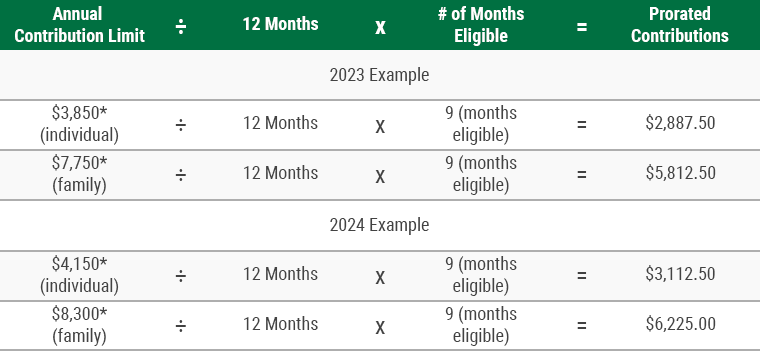Health Savings Account (HSA) FAQs
The main requirement for opening an HSA is having a high-deductible health plan that meets IRS guidelines for the annual deductible and out-of-pocket maximum. To be an eligible individual and qualify for an HSA, you must also meet the following requirements.
-
You are not covered by any other non-HDHP health plan, such as a spouse's plan, that provides any benefits covered by your HDHP plan.
-
You are not enrolled in Medicare.
-
You do not receive health benefits under TRICARE.
-
You have not received Veterans Administration (VA) benefits within the past three months.
-
You cannot be claimed as a dependent on another person's tax return.
-
You are not covered by a general purpose health care flexible spending account (FSA) or health reimbursement account (HRA). Alternative plan designs, such as a limited-purpose FSA or HRA, might be permitted.
An HDHP is a health plan that satisfies certain requirements for deductibles and out-of-pocket expenses. View the IRS guidelines and eligible expenses.
In addition to your HDHP, you may have coverage from "permitted insurance" which is coverage related to compensation from workers' compensation, tort liabilities, liabilities relating to ownership or use of property, insurance for a specified disease or illness and insurance that pays a fixed amount per day of hospitalization. Coverage for accidents, disability, dental care, vision care or long-term care does not disqualify you from opening an HSA.
No. Each spouse must open a separate HSA. You can, however, give your spouse access to your HSA by designating them as an authorized signer on the account.
Anyone can contribute to your HSA on your behalf.
No. Contributions may be made by you, or on your behalf, even if you are retired, have no income, or your income is less than your contributions.
Yes. The IRS determines the maximum amount that can be contributed to an HSA during the calendar year. View this year's contribution limits.
You must prorate your HSA contributions to avoid tax penalties. Below are examples:

Mid-year Coverage
If your HSA-compatible coverage begins in July, you can contribute the maximum amount for that year provided you maintain coverage until December 31st of the following year.
Health Plan Status Change
If you begin the year with family coverage and switch to single coverage in July of that year, you are eligible to contribute half of the family coverage contribution maximum and half of the individual coverage contribution maximum.
Yes, yearly contributions should be made by your tax filing deadline, generally April 15 of the following year.
If your HSA contributions exceed the IRS contribution limits, you must report the excess amount as gross income on your income tax. You will also have to pay additional excise tax on this amount. However, you can remove the excess contributions by submitting an Excess Contribution Removal form to us within that tax year.
You can pay for a wide range of IRS-qualified medical expenses with your HSA, including many that aren't typically covered by health insurance plans. This includes deductibles, co-insurance, prescriptions, dental and vision care, and more. For a complete list of IRS-qualified medical expenses, visit irs.gov or our qualified expenses page.
Generally, health insurance premiums ARE NOT considered IRS-qualified medical expenses, UNLESS they are for:
-
Qualified long-term care insurance,
-
COBRA health care continuation coverage
-
Health care coverage while an individual is receiving unemployment compensation
For individuals over 65, the following premiums ARE considered IRS-qualified medical expenses:
-
Medicare Parts A, B, D, Medicare HMA
-
Employee portion paid for employer-sponsored health insurance
-
Employee portion paid for employer-sponsored retiree health insurance
Yes, as long as the IRS-qualified medical expenses were incurred after your HSA was established, you can pay them or reimburse yourself with HSA funds at any time. Just be sure to keep sufficient records to show that these expenses were not previously paid for by another source or taken as an itemized deduction in any prior tax year.
As the HSA accountholder, you are responsible. So it's important to keep records of the IRS-qualified medical expenses you pay for with your HSA in order to exclude those dollars from your gross income.
HSA funds that are used to pay for non IRS-qualified medical expenses are considered part of your gross income and subject to an additional 20%. Exceptions include HSA distributions that are made after an accountholder's death, disability, or after they turn 65.
You can invest your HSA funds in any IRA-approved investment, such as bank accounts, annuities, certificates of deposit, stocks, mutual funds, or bonds. You can't invest HSA funds in life insurance contracts, or in collectibles (e.g., any work of art, antique, metal, gem, stamp, coin, alcoholic beverage, or other tangible personal property). HSAs may, however, be invested in certain types of bullion or coins.
Please note: An HSA trust or custodial agreement may restrict options to certain types of permissible investments (e.g., particular investment funds).
Yes. Generally, you are able to transfer or rollover funds from an MSA or HSA with another custodian to your current HSA at HSA Bank. You are limited to one rollover per twelve-month period and the rollover must be completed within 60 days. For more information and step-by-step instructions regarding each process, please visit our dedicated transfer/rollover page.
Yes. Money spent on ineligible costs before age 65 is subject to income tax plus a 20 percent penalty. After you turn 65, you won’t pay the penalty, but the distribution will still be subject to income tax.
You can use HSA funds to pay for Medicare premiums, including Medicare Part B, which covers outpatient care, and Part D, which covers prescription drugs. (Most people don't pay premiums for Part A.) You can't, however, use the funds for premiums for supplemental, or Medigap, policies.
